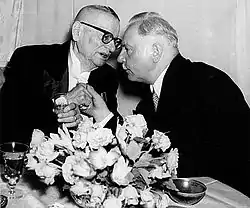Foreign policy
A state's foreign policy is its objectives and activities in relation to its interactions with other states, whether bilaterally or through multilateral platforms.[2] The Encyclopedia Britannica notes that a country's foreign policy may be influenced by "domestic considerations, the policies or behaviour of other states, or plans to advance specific geopolitical designs."[2]

J. K. Paasikivi, the President of Finland, was remembered as a main architect of Finland's foreign policy with the Soviet Union after the Second World War.[1] From left to right: Paasikivi and chairman of the Supreme Soviet Kliment Voroshilov in Moscow.
| Part of a series on |
| Politics |
|---|
.svg.png.webp) |
|
|
See also
Notes and references
- Wilsford 1995, pp. 347–352.
- Foreign policy, Encyclopedia Britannica (published January 30, 2020).
Further reading
- Christopher Hill, The Changing Politics of Foreign Policy, Basingstoke: Palgrave Macmillan, 2003.
- Jean-Frédéric Morin and Jonathan Paquin, Foreign Policy Analysis: A Toolbox, Palgrave, 2018.
- Steve Smith, Amelia Hadley and Tim Dunne (eds), Foreign Policy: Theories, Actors, Cases, 1st ed., Oxford: Oxford University Press, 2008.
- Frank A. Stengel and Rainer Baumann, "Non-State Actors and Foreign Policy," The Oxford Encyclopedia of Foreign Policy Analysis, edited by Cameron Thies, 266-86. Oxford: Oxford University Press. doi: 10.1093/acrefore/9780190228637.013.456.
- The definition of foreign policy, according to the Encyclopædia Britannica, here in the video
External links
 Media related to Foreign policy at Wikimedia Commons
Media related to Foreign policy at Wikimedia Commons
| Wikiquote has quotations related to: Foreign policy |
This article is issued from Wikipedia. The text is licensed under Creative Commons - Attribution - Sharealike. Additional terms may apply for the media files.